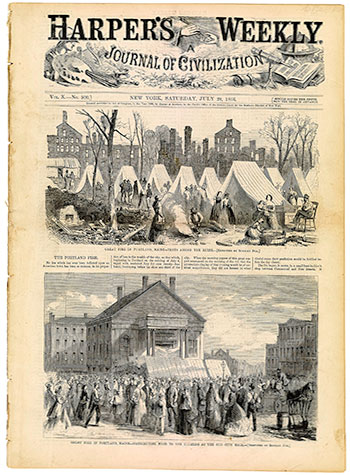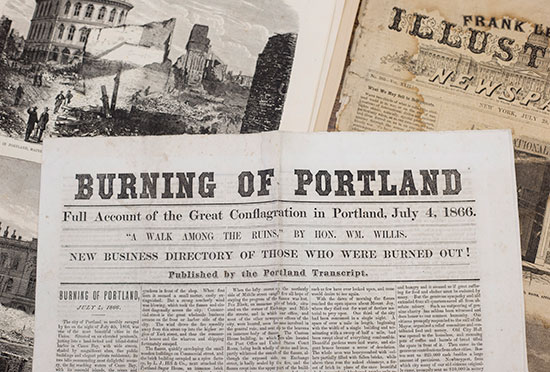Reporting From the Ruins
The Great Fire of 1866 stopped the presses in Portland for weeks, at a time when the city had several daily and weekly publications providing a wide variety of news, essays, advertising and other information.
But even with their offices left in ashes, most local newspapers found other ways to cover, print and disseminate information about the “Great Conflagration.” Publishers in neighboring cities printed some of the papers and offered their own accounts of the “Terrible Fire in Portland!”
Newspapers and magazines in Boston, New York and elsewhere sent reporters, photographers and artists to capture the terrifying July 4th fire and its aftermath in a flurry of superlatives and often unattributed tales of loss, injury and death.
“This was big news,” said Earle G. Shettleworth Jr., Maine’s state historian. “It was the biggest fire of its kind in the United States up to that time.”

No fire has ever “been so ruinous” on an American town, Harper’s Weekly wrote in its July 21 issue. Photo by Derek Davis/Staff Photographer. Courtesy of Maine Historic Preservation Commission.
The Portland Daily Press, a forerunner of the Portland Press Herald, published a double-sided handbill on the morning of Friday, July 6, when the blaze that started Wednesday afternoon was mostly out.
“Every newspaper office in the city was destroyed,” the Daily Press reported. “There is no exception – The Argus, Advertiser, Press, Mirror, Transcript, Zion’s Advocate and Price Current printing offices are gone.”
“The newspapers have shown most commendable spirit and enterprise,” the Kennebec Journal in Augusta reported a week later. “The Press, Argus and Advertiser were published Friday morning; the Star, Thursday afternoon, and even the Transcript issued a small sheet. Though much reduced in size, they live and will continue to be published.”
The Daily Press published its first handbill after the fire at one of three small print shops in the city that survived the blaze.
“We are indebted to the courtesy of Mr. F.G. Rich,” the Daily Press reported. “It was a tight squeeze for Bro. R., as the building was on fire several times and was saved only by the greatest exertions.”
The Portland Transcript put out a one-page handbill Thursday afternoon that included a brief description of the fire’s devastation – “A great calamity has befallen our city . . .” – and an explanation of the paper’s future publishing plans.
“We shall endeavor, if possible, to issue a paper next week, and as regularly thereafter as possible until we get settled in a new office,” the Transcript reported. “We are obliged to go out of the city to print this extra, and shall probably be forced to print the paper elsewhere for a time.”
The Oxford Democrat, published in Norway, reported a week later that the Daily Press was being published in Biddeford and the Daily Argus in Saco. “The Mirror will be suspended for a few weeks,” the Democrat reported. “We hear nothing as to what will be done with the Advocate or Price Current.”
Few of the city’s publishers were prepared for such deep financial losses. Brown Thurston, who operated Portland’s biggest publishing house, “suffers more loss than any other printer. He did not save an article from his large establishment. His loss is $20,000, on which he had insurance for only $6,000,” the Daily Press reported. The loss equals about $500,000 in today’s currency.
“The proprietors of the Transcript had the first side of their large edition for this week printed (when the fire broke out), and the other side was to be printed on Thursday, but it went (up in flames) with all their printing materials,” the Daily Press reported. “They had but small insurance.”
Meanwhile, the Daily Press itself had only $7,525 in coverage for $12,000 in losses – about $300,000 today – including several printing presses and type styles, newspaper files and a library of reference books.
“We have saved our subscription list and our accounts,” the Daily Press reported. “The publication of the Press... will not be suspended. An order was sent by telegraph yesterday morning for a new press and new fonts of type, and arrangements have been made to continue the publication in some form until our new materials arrive.”

A month after the fire, the Portland Transcript published this special edition, featuring “A Full Account” of the conflagration. Photo by Derek Davis/Staff Photographer. Courtesy of Maine Historic Preservation Commission.
A month after the fire, the Portland Transcript published a special edition under a banner headline, “Burning of Portland,” which promised to be “A Full Account of the Great Conflagration.” It included a faithful retelling of events, “A Walk Among the Ruins,” by William Willis, and “A New Business Directory of Those Who Were Burned Out!”
News of the fire was telegraphed to newspapers around the globe, including provocative details that drew readers but couldn’t always be corroborated. The Transcript suggested as much when it reported that a mother and child had been exhumed from the rear of their late residence on Washington Street.
“It is not improbable that other lives were lost, and numerous reports to that effect were afloat, but few of them were well authenticated,” the Transcript reported. “A correspondent of the Boston Journal reports that an infant was thrown from a two-story window by its frantic mother, and the men who stood below failing to catch the little one, its brains were dashed out on the pavement. The mother jumped afterwards and was caught uninjured.”
Harper’s Weekly, a popular New York-based political magazine, used flowery prose to describe Portland as gorgeous and flourishing before the fire.
“There were few more beautiful cities in the country than Portland,” the editors effused in the magazine’s July 21 issue. Portland’s seaside heights were “covered with spacious and delightful houses standing under noble trees and surrounded by green gardens.” Its trade was “prosperous; its society cultivated; its public spirit and generosity famous.”
The magazine noted that “the great calamity which has befallen the city has awakened the widest sympathy” from other cities, with hundreds of thousands of dollars pouring in from Boston, Bangor, Providence, Brooklyn, Buffalo, Philadelphia and New York for “relief of the sufferers.” The magazine sent an artist to capture “striking and faithful views of the great fire,” which were published with a story the following week.
“No fire which has ever been inflicted upon an American town has been so ruinous,” the magazine reported, “with unabated fury for over twenty-four hours, destroying before its close one-third of the city.”
The Great Fire of 1866
The Night Portland Burned
A firecracker and a pile of wood shavings turn a day of celebration into a “frightful calamity.”
MorePortland's Plea is Answered
Before the smoldering ruins of Portland’s Great Fire had cooled, city leaders were calling on communities near and far to send food, shelter and money to rebuild.
More
Tell your friends